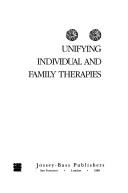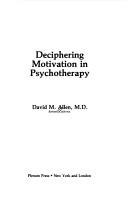| Listing 1 - 10 of 10 |
Sort by
|

ISBN: 1555420788 Year: 1988 Publisher: London Jossey-Bass
Abstract | Keywords | Export | Availability | Bookmark
 Loading...
Loading...Choose an application
- Reference Manager
- EndNote
- RefWorks (Direct export to RefWorks)
Family psychotherapy --- Individuation (Psychology) --- Psychotherapy --- Self --- Personal identity --- Consciousness --- Individuality --- Mind and body --- Personality --- Thought and thinking --- Will --- Psychagogy --- Therapy (Psychotherapy) --- Mental illness --- Clinical sociology --- Mental health counseling --- Psychology --- Family group therapy --- Family therapy --- Families --- Group psychotherapy --- Marriage counseling --- Treatment --- Health and hygiene

ISBN: 9783161495663 3161495667 Year: 2008 Volume: 238 Publisher: Tübingen Mohr
Abstract | Keywords | Export | Availability | Bookmark
 Loading...
Loading...Choose an application
- Reference Manager
- EndNote
- RefWorks (Direct export to RefWorks)
Bible --- Criticism, interpretation, etc --- Relation to Deuteronomy --- Relation to Hebrews --- 227.1*9 --- 227.1*9 Brief van Paulus aan de Hebreeën --- Brief van Paulus aan de Hebreeën --- Bible. --- Epistle to the Hebrews --- Hebräerbrief (Book of the New Testament) --- Hebrews (Book of the New Testament) --- Poslanie do Evreite (Book of the New Testament) --- Risālah ilá al-ʻIbrānīyīn (Book of the New Testament) --- Deuteronomium (Book of the Old Testament) --- Deuteronomy (Book of the Old Testament) --- Devarim (Book of the Old Testament) --- Kitāb-i Divārīm (Book of the Old Testament) --- Shinmeiki (Book of the Old Testament) --- Sifr al-Tathniyah (Book of the Old Testament) --- Sinmyŏnggi (Book of the Old Testament) --- Tas̲niyah (Book of the Old Testament) --- Tathniyah (Book of the Old Testament) --- Criticism, interpretation, etc. --- Relation to Hebrews. --- Relation to Deuteronomy.

ISBN: 0306437902 Year: 1991 Publisher: London Plenum Press
Abstract | Keywords | Export | Availability | Bookmark
 Loading...
Loading...Choose an application
- Reference Manager
- EndNote
- RefWorks (Direct export to RefWorks)
Book
ISBN: 9780281064700 9780281070404 Year: 2013 Publisher: London SPCK
Abstract | Keywords | Export | Availability | Bookmark
 Loading...
Loading...Choose an application
- Reference Manager
- EndNote
- RefWorks (Direct export to RefWorks)
Book
Year: 1978 Publisher: Cincinnati Municipal environmental research laboratory
Abstract | Keywords | Export | Availability | Bookmark
 Loading...
Loading...Choose an application
- Reference Manager
- EndNote
- RefWorks (Direct export to RefWorks)
Book
ISBN: 9780567678041 0567678040 9780567678058 9780567691217 0567678059 Year: 2020 Volume: 579 Publisher: London Bloomsbury T&T Clark
Abstract | Keywords | Export | Availability | Bookmark
 Loading...
Loading...Choose an application
- Reference Manager
- EndNote
- RefWorks (Direct export to RefWorks)
Bible. --- Bible --- Relation to the Old Testament. --- Hermeneutics. --- 22.06*2 --- 22.06*2 Gebruik van het Oude Testament in het Nieuwe Testament. Testimonia --- Gebruik van het Oude Testament in het Nieuwe Testament. Testimonia --- Ba-yon Tipan --- Bagong Tipan --- Jaji ma Hungi --- Kainē Diathēkē --- New Testament --- Nouveau Testament --- Novo Testamento --- Novum Testamentum --- Novyĭ Zavet --- Novyĭ Zavi︠e︡t Gospoda nashego Īisusa Khrista --- Novyĭ Zavit --- Nuevo Testamento --- Nuovo Testamento --- Nye Testamente --- Perjanjian Baru --- Dhamma sacʻ kyamʻʺ --- Injīl --- Criticism, interpretation, etc.
Book
ISBN: 9780567700681 0567700682 Year: 2021 Publisher: London: T&T Clark International,
Abstract | Keywords | Export | Availability | Bookmark
 Loading...
Loading...Choose an application
- Reference Manager
- EndNote
- RefWorks (Direct export to RefWorks)
Book
ISBN: 303036822X 3030368211 Year: 2020 Publisher: Cham : Springer International Publishing : Imprint: Springer,
Abstract | Keywords | Export | Availability | Bookmark
 Loading...
Loading...Choose an application
- Reference Manager
- EndNote
- RefWorks (Direct export to RefWorks)
This book discusses one of the hottest topics in science today, i.e., the concern over certain problematic practices within the scientific enterprise. It raises questions and, more importantly, begins to supply answers about one particularly widespread phenomenon that sometimes impedes scientific progress: group processes. The book looks at many problematic manifestations of “going along with the crowd” that are adopted at the expense of truth. Closely related is the concept of pathological altruism or altruism bias—the tendency of scientists to bias their research in order to further the ideological or financial interests of an “in-group” at the expense of both the interest of other groups as well as the truth. The book challenges the widespread notion that science is invariably a benevolent, benign process. It defines the scientific enterprise, in practice as opposed to in theory, as a cultural system designed to produce factual knowledge. In effect, the book offers a broad and unique take on an important and incompletely explored subject: research and academic discourse that sacrifices scientific objectivity, and perhaps even the scientist’s own ethical standards, in order to further the goals of a particular group of researchers or reinforce their shared belief system or their own interests, whether economic, ideological, or bureaucratic.
Science --- Psychological aspects. --- Health psychology. --- Medicine. --- Technology—Sociological aspects. --- Psychotherapy. --- Counseling. --- Health Psychology. --- Medicine/Public Health, general. --- Science and Technology Studies. --- Psychotherapy and Counseling. --- Counselling --- Helping behavior --- Psychology, Applied --- Clinical sociology --- Interviewing --- Personal coaching --- Social case work --- Psychagogy --- Therapy (Psychotherapy) --- Mental illness --- Mental health counseling --- Health Workforce --- Health psychology --- Health psychology, Clinical --- Psychology, Clinical health --- Psychology, Health --- Salutogenesis --- Clinical psychology --- Medicine and psychology --- Treatment --- Investigació --- Frau científic --- Aspectes morals --- Interès general --- Interès col·lectiu --- Interès particular i interès general --- Interès públic --- Utilitat pública --- Ciències polítiques --- Estat --- Denúncies d'irregularitats --- Accions col·lectives (Procediment civil) --- Bé comú --- Interès personal --- Serveis d'interès general --- Aspectes ètics --- Ètica --- Condicions morals --- Falsedat científica --- Falsejament científic --- Falsificacions científiques --- Frau en la ciència --- Impostura científica --- Ciència --- Frau --- Investigació científica --- Investigació tecnològica --- Recerca --- Treball intel·lectual --- Dades de recerca --- Descobriments científics --- Experimentació animal --- Investigació activa --- Investigació en infermeria --- Investigació matemàtica --- Investigació mèdica --- Investigació militar --- Investigació operativa --- Investigació qualitativa --- Investigació quantitativa --- Investigació amb mètodes mixtos --- Models animals en la investigació --- Recerca industrial --- Erudició --- Indicadors tecnològics --- Investigadors --- Literatura científica --- Metodologia --- Serveis d'informació
Digital
ISBN: 9783030368227 Year: 2020 Publisher: Cham Springer International Publishing
Abstract | Keywords | Export | Availability | Bookmark
 Loading...
Loading...Choose an application
- Reference Manager
- EndNote
- RefWorks (Direct export to RefWorks)
This book discusses one of the hottest topics in science today, i.e., the concern over certain problematic practices within the scientific enterprise. It raises questions and, more importantly, begins to supply answers about one particularly widespread phenomenon that sometimes impedes scientific progress: group processes. The book looks at many problematic manifestations of “going along with the crowd” that are adopted at the expense of truth. Closely related is the concept of pathological altruism or altruism bias—the tendency of scientists to bias their research in order to further the ideological or financial interests of an “in-group” at the expense of both the interest of other groups as well as the truth. The book challenges the widespread notion that science is invariably a benevolent, benign process. It defines the scientific enterprise, in practice as opposed to in theory, as a cultural system designed to produce factual knowledge. In effect, the book offers a broad and unique take on an important and incompletely explored subject: research and academic discourse that sacrifices scientific objectivity, and perhaps even the scientist’s own ethical standards, in order to further the goals of a particular group of researchers or reinforce their shared belief system or their own interests, whether economic, ideological, or bureaucratic.
Psychology --- Sociology of knowledge --- Law --- Psychiatry --- Human medicine --- Engineering sciences. Technology --- medische psychologie --- geneeskunde --- psychotherapie --- technologie --- counseling
Book
ISBN: 9783030368227 Year: 2020 Publisher: Cham Springer International Publishing :Imprint: Springer
Abstract | Keywords | Export | Availability | Bookmark
 Loading...
Loading...Choose an application
- Reference Manager
- EndNote
- RefWorks (Direct export to RefWorks)
Psychology --- Sociology of knowledge --- Law --- Psychiatry --- Human medicine --- Engineering sciences. Technology --- medische psychologie --- geneeskunde --- psychotherapie --- technologie --- counseling
| Listing 1 - 10 of 10 |
Sort by
|

 Search
Search Feedback
Feedback About UniCat
About UniCat  Help
Help News
News